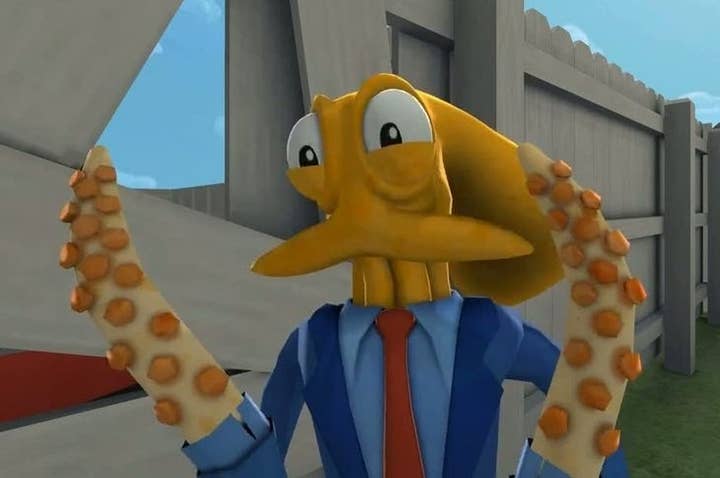Play matters more than video games - Octodad dev
Young Horses' John Murphy explains how the studio designed for YouTube virality and the lost art of play
Much like an octopus with the ability to disguise itself as a human, Young Horses' debut effort Octodad: Dadliest Catch is a testament to the bizarre wonders of evolution. The game began life as a DePaul University student project in the summer of 2010. In 2011 it became a finalist in the 2011 Independent Games Festival student category, and then a successfully Kickstarted commercial project months before Double Fine touched off the crowdfunding craze in earnest. In 2013, Octodad was a featured part of Sony's E3 presence, both on stage at the PlayStation press conference and in the company's booth.
Now Dadliest Catch is finally out in the wild, having launched on Steam in January and with a PlayStation 4 release set for early next month. Young Horses designer John Murphy recently spoke with GamesIndustry International about the industry's changes over the course of Octodad's development, and how Octodad changed to keep up.
When development on Octodad began in 2010, indie games were only starting to become a respected part of the mainstream, Murphy said. And despite the success stories in the field, the real buzz was found around Facebook games. The idea of Octodad being part of Sony's E3 briefing would have been crazy.
"Our expectations for what was possible for the game, for us, and for the studio has changed a lot over the past few years as indie games in general have sort of grown up around us," Murphy said. "It's exciting, and at times almost unnerving that we're in this position we just sort of stumbled into."
"Expressive playfulness is something a lot of games don't have these days...A lot of games feel more like work, or some sort of skill-based mechanical thing that doesn't have that playfulness."
While Murphy referred to the team as "stumbling into" an enviable position, the team's good fortune was supplemented by good decisions. For example, when the team realized the strong appeal Octodad held for YouTube Let's Play viewers, they changed the game by identifying the audience need it was fulfilling, and then doing what they could to support it.
"We started designing Deadliest Catch to encourage [Let's Play videos] and create a lot of room where there are a lot of different options for a player to create their own comedy and put their own personality into that," Murphy said.
As an example, he pointed to the game's grocery store level, where players have the option to knock over other characters' shopping carts, put items into them, or climb Octodad into the cart itself. And even if they were playing the game according to its stated premise--to behave as a normal human father would in that situation--the game's controls meant players could wind up getting involved in that sort of chaos accidentally. And since every player would approach and execute the tasks differently, there was room for variety, distinct bits of fun that would emerge, unique to each playthrough and each player.
"You can see a player's approach to the way they play in how they approach the fuzzy areas," Murphy said, adding, "Expressive playfulness is something a lot of games don't have these days. That seems to be one of the newer themes arising in indie games, the idea that play matters more than video games. A lot of games feel more like work, or some sort of skill-based mechanical thing that doesn't have that playfulness. But in my opinion, that's what the best games are built upon."
That's not the only rising theme in indie games that Octodad ties in to. The game is also riding a massive wave of interest in the indie scene that has led to a world where console makers fight for the community's affections and Kickstarter projects beget multi-billion dollar companies. But unlike the Facebook frenzy that was taking place when the Octodad team first started on the game, Murphy sees the current interest in the field as more sustainable than the social gaming bubble.
"I'm not saying that gold rush thing isn't happening, to some extent," Murphy said. "But because it's more dynamic--it's not one platform or style of game; it's like an attitude toward the sorts of things that can be games--for that to go away seems more difficult."
Instead, Murphy expects the indie boom to essentially re-stratify the gaming industry. Murphy agreed with Steve Gaynor's observations from the DICE Summit, saying he expects the maturation of the indie scene bringing back a middle tier of developer that isn't quite indie, but isn't exactly Activision, either.
"There are enough indies that are high-profile enough that their follow-up projects are going to have expectations associated with them," Murphy said. "Those will form an additional component of the re-emergence of a middle-ground studio and size of game. It is getting more crowded, so people who are just started out will need to do things to stand out even more than we did, for example."

